 W
WBing was a dog who received the Dickin Medal in 1947 from the People's Dispensary for Sick Animals for bravery in service during the Second World War.
 W
WCommando was a pigeon used in service with the British armed forces during the Second World War to carry crucial intelligence. The pigeon carried out more than ninety missions during the war, and received the Dickin Medal for three particularly notable missions in 1942. The medal was later sold at an auction for £9,200.
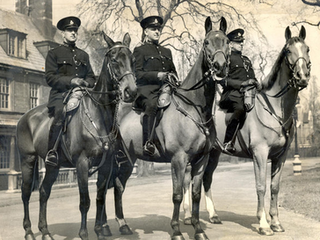 W
WThere have been five equine recipients of the Dickin Medal since its creation in 1943. The first three were British horses Regal, Olga, and Upstart, the Canadian Corps Cavalry horse Warrior and the American Sergeant Reckless. The first three received their awards at a ceremony on 11 April 1947 at Hyde Park in recognition of the courage they exhibited during World War II. These three were mounts used by members of the Metropolitan Police Service during official duties and to aid civilians during the Blitz and later bombings from September 1940 to late 1944. Warrior served on the Western Front during World War I and was awarded an honorary posthumous medal in September 2014. Another posthumous award was given in 2016 to Sergeant Reckless, a mare who served during the Korean War with the United States Marine Corps and was given the rank of staff sergeant. Of the recipients, three were honoured for courage during active duty, one for remaining calm when his stable was bombed on two occasions and one to commemorate the actions of animals during the First World War. The first three horses were selected primarily as a way to honour the entire mounted police force instead of singling out any particular deed. Olga, Upstart and Regal are buried at the Metropolitan Police Mounted Training Establishment at Thames Ditton which also displays their medals in a museum.
 W
WG.I. Joe was a pigeon noted for his service in the United States Army Pigeon Service. The bird is part of the homing pigeons used during World War I and World War II for communication and reconnaissance purposes. G.I. Joe had the name tag, Pigeon USA43SC6390. He was hatched in March 1943, in Algiers, North Africa and underwent a training for two-way homing pigeons perfected at Fort Monmouth, in New Jersey.
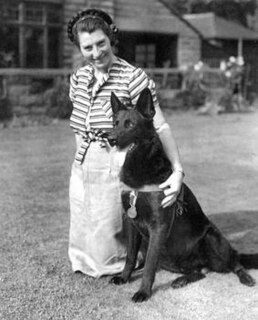 W
WJet of Iada a.k.a. Jet was a German Shepherd Dog, who assisted in the rescue of 150 people trapped under blitzed buildings. He was a pedigree dog born in Liverpool, and served with the Civil Defence Services of London. He was awarded both the Dickin Medal and the RSPCA's Medallion of Valor for his rescue efforts.
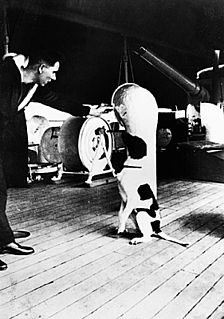 W
WJudy was a ship's dog on board HMS Gnat and HMS Grasshopper stationed on the Yangtze before and during World War II. She proved able to hear incoming aircraft, providing the crew with an early warning. After part of the crew transferred from the Gnat to the Grasshopper in June 1939 the ship was sent to Singapore after the British declaration of war on Germany. There she was on board the ship during the Battle of Singapore, which saw Grasshopper evacuate for the Dutch East Indies. It was sunk en route, and Judy was nearly killed having been trapped by a falling row of lockers. She was rescued when a crewman returned to the stricken vessel looking for supplies.
 W
WLucca was a German Shepherd/Belgian Malinois service dog who was employed by the United States Marine Corps for 6 years. She was trained to detect explosives. She was deployed twice to Iraq and once to Afghanistan. In her over 400 missions, no human fatalities occurred under her watch. In 2012, while on patrol in Afghanistan, she was injured by an IED blast, necessitating the amputation of her left leg. After recovering at Camp Pendleton, Lucca officially retired in 2012 and was adopted by her original handler, Gunnery Sergeant Chris Willingham.
 W
WRip, a mixed-breed terrier, was a Second World War search and rescue dog who was awarded the Dickin Medal for bravery in 1945. He was found in Poplar, London, in 1940 by an Air Raid warden, and became the service's first search and rescue dog. He is credited with saving the lives of over 100 people. He was the first of twelve Dickin Medal winners to be buried in the PDSA's cemetery in Ilford, Essex.
 W
WRob was a Collie dog who in February 1945 was awarded the Dickin Medal, considered to be the animals' Victoria Cross. He was alleged to have made over 20 parachute descents during the North African Campaign, serving with the SAS. However, in 2006, his actions were revealed as being a possible hoax perpetrated by members of his regiment in order to prevent Rob leaving after his original owners requested his return.
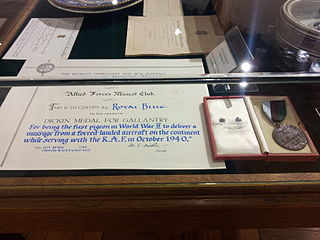 W
WRoyal Blue, also known as NURP.40.GVIS.453, was a male pigeon of the RAF pigeon service. He was awarded the Dickin Medal for bravery in March 1945 for being the first pigeon to deliver a message from an allied forced landed aircraft from the European mainland during World War II. He had originally been housed at the Royal Lofts at Sandringham, and was owned by King George VI.
 W
WSalty and Roselle were two guide dogs who were with their owners in the World Trade Center during the September 11 attacks in New York City. They each guided their owners out of the burning towers before they collapsed, feats which were later recognized when they were awarded the Dickin Medal by the British charity the People's Dispensary for Sick Animals. Roselle went on to be posthumously named American Hero Dog of the Year 2011 by American Humane, and has a book written about her.
 W
WSam was an army dog who served with the Royal Army Veterinary Corps Dog Unit. While serving in Bosnia and Herzegovina in the 1990s, Sam helped to apprehend an armed man and also to hold back an armed mob besieging a compound where Serbs were taking refuge. He received the Dickin Medal, the animals' equivalent of the Victoria Cross, in 2003 for these acts of bravery.
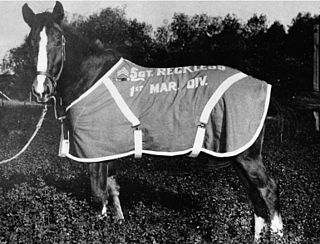 W
WStaff Sergeant Reckless, a decorated war horse who held official rank in the United States military, was a mare of Mongolian horse breeding. Out of a race horse dam, she was purchased in October 1952 for $250 from a Korean stableboy at the Seoul racetrack who needed money to buy an artificial leg for his sister. Reckless was bought by members of the United States Marine Corps and trained to be a pack horse for the Recoilless Rifle Platoon, Anti-Tank Company, 5th Marine Regiment, 1st Marine Division. She quickly became part of the unit and was allowed to roam freely through camp, entering the Marines' tents, where she would sleep on cold nights, and was known for her willingness to eat nearly anything, including scrambled eggs, beer, Coca-Cola and, once, about $30 worth of poker chips.
 W
WSimon was a ship's cat who served on the Royal Navy sloop-of-war HMS Amethyst. In 1949, during the Yangtze Incident, he received the PDSA's Dickin Medal after surviving injuries from a cannon shell, raising morale, and killing off a rat infestation during his service.
William of Orange was a male war pigeon of British military intelligence service MI14. He was awarded the 21st Dickin Medal for delivering a message from the Arnhem Airborne Operation. This message saved more than 2000 soldiers at the time of the Battle of Arnhem in September 1944. Its official name in military record is NPS.42.NS.15125. He received the Dickin Medal in May 1945.